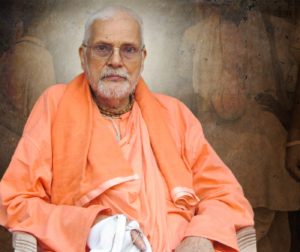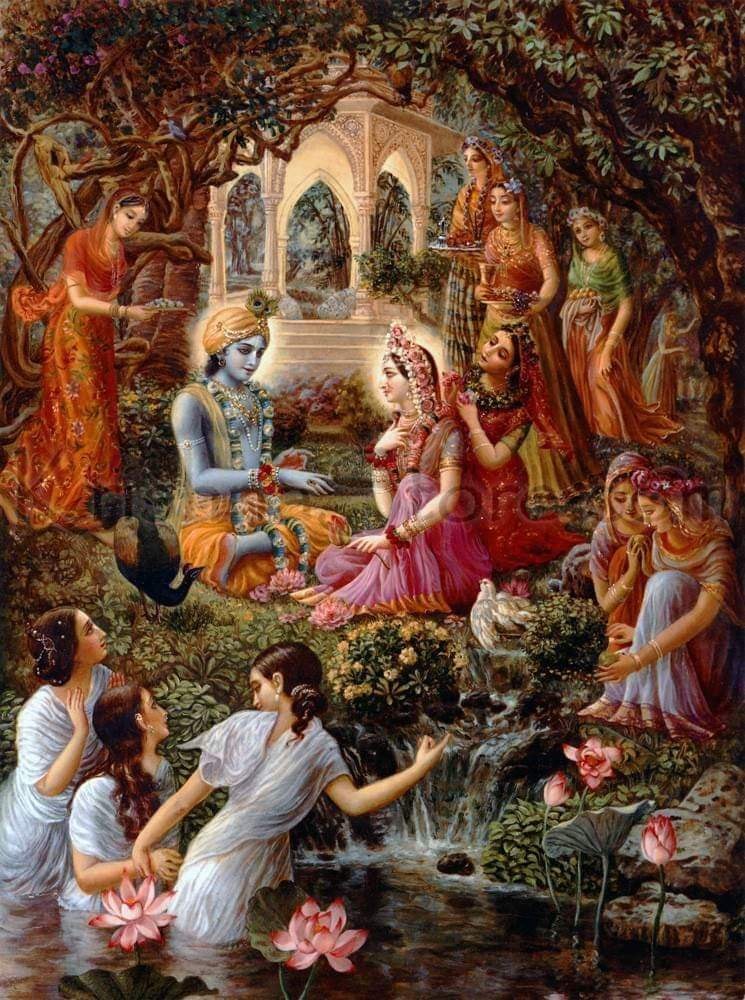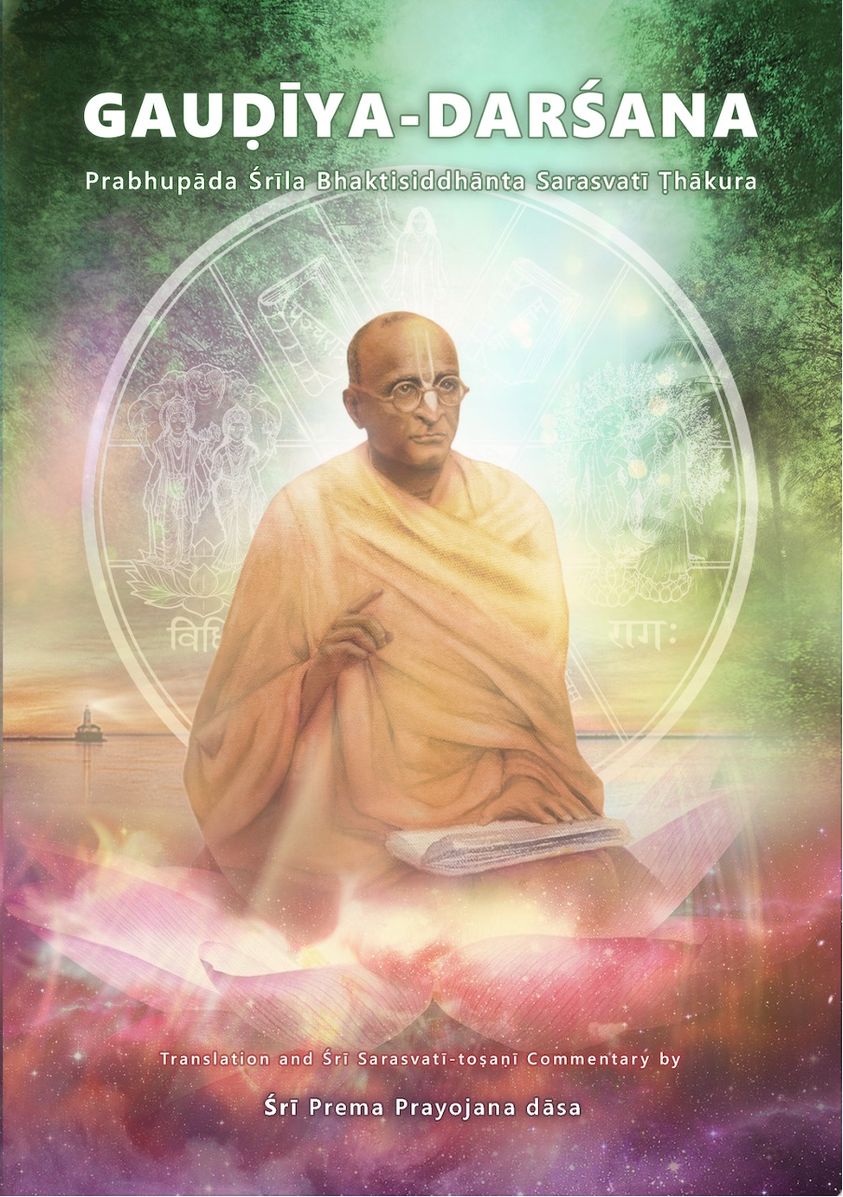January 31, 2020
[February 1, 2020 is the appearance day of Śrīla Advaita Ācārya in Vṛndāvana, India. The following is an excerpt of a bhāva anuvāda of a discourse by Śrīla Bhakti Vijñāna Bhāratī Gosvāmī Mahārāja on August 30, 2014. Editors’ input: Additional text has been included in square brackets to facilitate the flow of content.]

Śrīla Bhakti Vijñāna Bhāratī Gosvāmī Mahārāja
THE ECSTASY OF ADVAITA AND HARĪDĀSA

When Śrī Caitanya Mahāprabhu appeared in this world, Śrīla Advaita Ācārya began to dance in great ecstasy on the roof of his house. Nāmācārya Śrīla Haridāsa Ṭhākura also felt great jubilation. Śrīla Advaita Ācārya thought, “There surely must be some extraordinary cause, otherwise, how is it possible that both of us are experiencing jubilation within our hearts?” Later, after Śrīla Advaita Ācārya received news of Mahāprabhu’s appearance, he approached His home. Śrīmatī Sītā-devī arrived in a palanquin, offering a tiger’s claw as well as many other gifts for the newborn child. She also made arrangements so that no witch could cast a spell on the newborn child; it was for this reason that He was named Nimāi [after the bitter Neem tree as a protection against evil influences, so that He would not also die prematurely like his sisters did before His advent.]
NITYĀNANDA TRICKS ŚRĪ CAITANYA-DEVA

After taking sannyāsa, Śrī Caitanya-deva wandered here and there for three days intoxicated in ecstatic love and desiring to go to Vṛndāvana. At that time, Śrī Nityānanda Prabhu told a few cowherd boys to point towards the south when Śrī Caitanya-deva inquired about the direction to Vṛndāvana [to misdirect Śrī Caitanya-deva to Śāntipura] and sent word to Śrīla Advaita Ācārya [about Śrī Caitanya-deva’s imminent arrival]. Śrīla Advaita Ācārya arrived in a boat with a new set of saffron clothes, which took Śrī Caitanya-deva [who had arrived there as part of Nityānanda Prabhu’s plan.] by surprise. Śrī Caitanya-deva asked Śrīla Advaita Ācārya, “I am in Vṛndāvana. How is it that you are also here?” Śrīla Advaita Ācārya replied, “Mora bhāgya gangā tire tāhāra āgamana – It is my good fortune that you have come to the bank of the Ganges.”
Then Śrī Caitanya-deva asked, “So did Nityānanda lie to Me when He said I was in Vṛndāvana and could now bathe in the Yamuna?” Śrīla Advaita Ācārya replied, “No, he did not lie because in Prayāga there is a confluence of three rivers – Gaṅgā, Yamuna and Sarasvatī. Yamuna flows in the west and Gaṅgā in the east, and because You took Your bath on the western side, you have indeed bathed in the Yamuna.”
ADVAITA’S FEAST
Saying thus, Śrīla Advaita Ācārya brought Śrī Caitanya-deva to his home where he made arrangements for a variety of sumptuous preparations. His wife Śrīmatī Sītā-devī was an expert cook who could immediately make a variety of preparations. There is a beautiful narration of this pastime in Śrī Caitanya-caritāmṛta.
Śrī Caitanya-deva said, “Give Me only a few preparations on a separate leaf. Why have you arranged for these three leaf plates?” He was told, “These are for You, Nityānanda and for Your worshipable Lord. “Mahāprabhu said, “I cannot accept so many offerings.” Śrīla Advaita Ācārya then replied, “In Nīlācala, You savor fifty-six varieties of offerings [Endnote 1]. Besides this, You also accept bhoga at the places of soḍasa mātrika [16 different kinds of goddess like Cāmuṇḍā-devī, Vaiṣṇavī-devī, Jwala Mukhī-devī and so on] and the mahīṣīs. I have prepared an ordinary feast because I cannot cook elaborately; I am just a poor brāhmaṇa.” Furthermore, Śrīla Advaita Ācārya added, “What is served as the first helping, You should honor completely, and for the second serving, You should do the same. You may take only half of the third serving and leave the rest.”
THE TRANSCENDENTAL LOVING QUARREL

Then Nityānanda Prabhu began a prema kalāha [loving quarrel] with Śrīla Advaita Ācārya. He said, “I have been fasting since the past three days but, despite your invitation, should I remain fasting on the fourth day as well? What you have offered is not enough for Me.” On one hand, Mahāprabhu is saying this is too much, and on the other, Nityānanda Prabhu is saying it is too little. Śrīla Advaita Ācārya pleaded, “I am a poor brāhmaṇa so please be satisfied with whatever I could prepare and offer.” Nityānanda Prabhu said, “Because you have invited Us for lunch you are obliged to feed Us as much as We would like to eat.” Later, as if He were angry, Nityānanda Prabhu threw a handful of rice and said, “Enough is enough, now take away the leaf plate.” This is His pastime.
Śrīla Advaita Ācārya said, “[Śrī Caitanya-deva] Prabhu is a sannyāsī, He is not at fault, however, as far as this avadhūta [Nityānanda] is concerned, no one is aware whose disciple He is or what caste He belongs to, yet He eats in everyone’s homes! It is improper for me to sit with Him because I am householder brāhmaṇa. Prabhu will not accrue any fault because a sannyāsī is not affected by anna doṣa, but I am not a sannyāsī, I am a householder.” Nityānanda Prabhu said, “You have committed an offence, therefore you must invite a hundred sannyāsīs and feed them sumptuously to atone for your offence.” Then Śrīla Advaita Ācārya said, “I invited one and became unsettled, so why would I invite a hundred? I will not invite even one.” [Advaita Ācārya replied, “I shall never again invite another sannyāsī, for it is a sannyāsī who has spoiled all My brahminical smṛti regulations.” Śrī Caitanya-caritāmṛta Madhya 3.101] Although externally they appeared to be quarreling, in reality, they were glorifying each other. It is called vyādha-stuti – to glorify indirectly.
ŚRĪ CAITANYA-DEVA CALLS FOR ADVAITA

Although Bhagavān rarely reveals Himself, He descended after being obliged by Śrīla Advaita Ācārya’s invocation. Later, when Mahāprabhu exhibited His aiśvarya form during His śata-prahariyā-māhābhāvā’, He sent a message for Śrīla Advaita Ācārya in Śāntipura through Śrīrāma Paṇḍita to present himself along with his consort Śrīmatī Sītā-devī. Śrīla Advaita Ācārya, however, told Śrīrāma Paṇḍita to inform Mahāprabhu that he had not come. Śrīrāma Paṇḍita was in a great dilemma, ‘How can I speak a lie to Prabhu [Śrī Caitanya-deva] and at the same time honor Śrīla Advaita Ācārya’s order?’ This was his dilemma.
Upon Śrīrāma Paṇḍita’s arrival however, Śrī Caitanya-deva Himself said, “Śrīla Advaita Ācārya wants to test My Godhood, therefore he is hiding.” In this way, Śrīrāma Paṇḍita’s dilemma was resolved, and he didn’t have to lie. Śrī Caitanya-deva ordered, “Go and bring him”. When Śrīla Advaita Ācārya arrived, Śrī Caitanya-deva asked him to perform His worship. Does anyone speak like this? Śrī Caitanya-deva said this only to Śrīla Advaita Ācārya, because he had worshiped Him with Gaṅgā water and tulasī while fervently praying for His descent. He did so as he observed that people in general were no longer taking the name of Bhagavān. Only those who were very pious would utter the name of Govinda or Puṇḍarīkākśa and that too, only while taking bath.
ADVAITA’S ELIGIBILITY TO MAKE MAHĀPRABHU DESCEND

Our Śrīla Rūpa Gosvāmī has said:
ataḥ śrī-kṛṣṇa-nāmādi
na bhaved grāhyam indriyaiḥ
sevonmukhe hi jihvādau
svayam eva sphuraty adaḥ
(Bhakti-rasāmṛta-sindhu,1.2.234)
[Therefore material senses cannot appreciate Kṛṣṇa’s holy name, form, qualities and pastimes. When a conditioned soul is awakened to Kṛṣṇa consciousness and renders service by using his tongue to chant the Lord’s holy name and taste the remnants of the Lord’s food, the tongue is purified, and one gradually comes to understand who Kṛṣṇa really is.]
Bhagavān’s name, form, qualities, pastimes, associates and abode are beyond the comprehension of the materially contaminated senses; so how can one realize them? They will be revealed only to the service-inclined senses. According to the eligibility of the servant, the requisite knowledge to serve Bhagavān will be revealed. Śrīla Advaita Ācārya had the eligibility to summon Bhagavān, forcing Him to descend, and Śrīmatī Sītā Devī served that Bhagavān in all respects.
SĪTĀ SUPPORTS ADVAITA

Śrīmatī Sītā Devī would accompany her husband to Jagannātha Purī. They would purchase Jagannātha prasāda and also make various preparations at home. So, when Śrī Caitanya-deva made the rule that He would take only one fourth of whatever was offered to Him for prasāda, all the devotees became disheartened. However, there were no rules or restrictions as far as the invitations of Śrīla Advaita Ācārya and Śrīla Sārvabhauma Bhaṭṭācārya were concerned.
Once Śrīla Advaita Ācārya told Śrī Caitanya-deva, “Please come along with Your shadow”. Meaning: ‘You come all alone, don’t bring any other sannyāsīs with You.’ So what could be done? Suddenly, strong winds and heavy rains blew, and all the others accompanying Mahāprabhu were lost. Eventually, Śrī Caitanya-deva arrived to Śrīla Advaita Ācārya’s house alone. Śrīla Advaita Ācārya was very pleased with Indra saying, “You have performed a good deed. You have helped me like a friend.” Then, Śrī Caitanya-deva said, “Now you have become the servant of Indra because you are praising him so much.”
I remembered this pastime as [it shows how] Śrīmatī Sītā-devī would gladly join her husband in cooking a variety of dishes like piṭhā and serve Mahāprabhu sumptuously and thus please Him. Śrīmatī Sītā-devī would support Śrīla Advaita Ācārya whole-heartedly. That is why their invitation had no restrictions and Śrī Caitanya-deva praised their efforts very much.
SURRENDER MAKES ONE FEARLESS
When Śrīla Advaita Ācārya offered the ‘śrāddha-pātra’ (offering of oblations to the forefathers) to Nāmācārya Śrīla Haridāsa Ṭhākura, Śrīla Haridāsa Ṭhākura expressed some inhibition, “You belong to the society of brāhmaṇas and by this act of offering me the ‘śrāddha-pātra’ [Endnote 2], all will blaspheme you and this I cannot bear.” Śrīla Advaita Ācārya replied, “I will conduct myself in line with the opinion of the scriptures.” He did not bother with the opinion of the worldly people. Similarly, it is observed that even Śrīla Vṛndāvana dāsa Ṭhākura didn’t care for public opinion. Why is such a thing possible for them? Because they are surrendered to Bhagavān, they have no fear.
Śrīla Vṛndāvana dāsa Ṭhākura challenged the entire society by propagating the glories of hari-bhakti. For this reason, he is hailed as ‘Patita-pāvana Śrīla Vṛndāvana dāsa Ṭhākura’, the redeemer of the fallen. Like him, Śrīla Advaita Ācārya claimed, “Whatever I do, has its foundation in the scriptures.” Saying this he assured Nāmācārya Śrīla Haridāsa Ṭhākura that there was no cause of worry. And in all of Śrīla Advaita Ācārya’s activities, his wife, Śrīmatī Sītā-devī, supports him. So by the principle of śakti śaktimatayor abheda [the energetic and the energy are non-different], she has half the share in all of his activities.
___________________________________________________________________________________________________________________________________
Endnote 1
Śrī Caitanya-caritāmṛta Madhya 3.75 – Purport by Srila Bhaktivedānta Svāmi Mahārāja.
In this connection Advaita Ācārya referred to Caitanya Mahāprabhu’s eating at Jagannātha Purī. Lord Jagannātha and Śrī Caitanya Mahāprabhu are identical. Advaita Ācārya pointed out that in Jagannātha Purī Caitanya Mahāprabhu ate fifty-four times a day, and each time He ate many hundreds of pots of food.
Endnote 2
Śrī Caitanya-caritāmṛta, Antya 3.222 – Translation and Purport by Srila Bhaktivedānta Svāmi Mahārāja.
tumi khāile haya koṭi-brāhmaṇa-bhojana
eta bali, śrāddha-pātra karāilā bhojana
Translation:
“Feeding you is equal to feeding ten million brāhmaṇas,” Advaita Ācārya said. “Therefore, accept this śrāddha-pātra.” Thus Advaita Ācārya made him eat.
Purport:
Śrāddha is prasādam offered to the forefathers at a certain date of the year or month. The śrāddha-pātra, or plate offered to the forefathers, is then offered to the best of the brāhmaṇas in society. Instead of offering the śrāddha-pātra to any other brāhmaṇa, Advaita Ācārya offered it to Haridāsa Ṭhākura, considering him greater than any of the foremost brāhmaṇas. This act by Śrī Advaita Ācārya proves that Haridāsa Ṭhākura was always situated in a transcendental position and was therefore always greater than even the most exalted brāhmaṇa, for he was situated above the mode of goodness of the material world. Referring to the Bhakti-sandarbha, text 177, Śrīla Bhaktisiddhānta Sarasvatī Ṭhākura quotes the following statements from the Garuḍa Purāṇa in this connection:
brāhmaṇānāṁ sahasrebhyaḥ satra-yājī viśiṣyate
satra-yāji-sahasrebhyaḥ sarva-vedānta-pāragaḥ
sarva-vedānta-vit-koṭyā viṣṇu-bhakto viśiṣyate
vaiṣṇavānāṁ sahasrebhya ekānty eko viśiṣyate
“A brāhmaṇa qualified to offer sacrifices is better than an ordinary brāhmaṇa, and better than such a brāhmaṇa is one who has studied all the Vedic scriptures. Among many such brāhmaṇas, one who is a devotee of Lord Viṣṇu is the best, and among many such Vaiṣṇavas, one who fully engages in the service of the Lord is the best.”
bhaktir aṣṭa-vidhā hy eṣā yasmin mlecche ’pi vartate
sa viprendro muni-śreṣṭhaḥ sa jñānī sa ca paṇḍitaḥ
tasmai deyaṁ tato grāhyaṁ sa ca pūjyo yathā hariḥ
“There are many different kinds of devotees, but even a Vaiṣṇava coming from a family of mlecchas or yavanas is understood to be a learned scholar, complete in knowledge, if he knows the Vaiṣṇava philosophy. He should therefore be given charity, for such a Vaiṣṇava is as worshipable as the Supreme Personality of Godhead.”
na me ’bhaktaś catur-vedī mad-bhaktaḥ śva-pacaḥ priyaḥ
tasmai deyaṁ tato grāhyaṁ sa ca pūjyo yathā hy aham
Lord Kṛṣṇa says, “Even if a nondevotee comes from a brāhmaṇa family and is expert in studying the Vedas, he is not very dear to Me, whereas even if a sincere devotee comes from a low family of meat-eaters, he is very dear to Me. Such a sincere pure devotee should be given charity, for he is as worshipable as I.”

 Posted in
Posted in 







